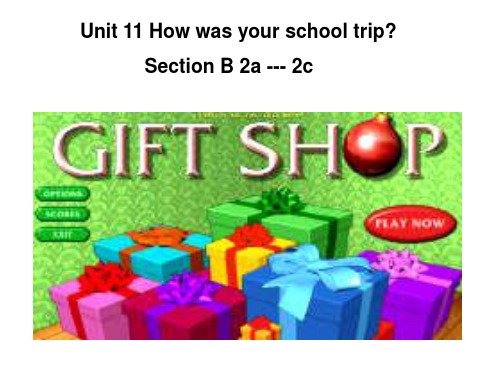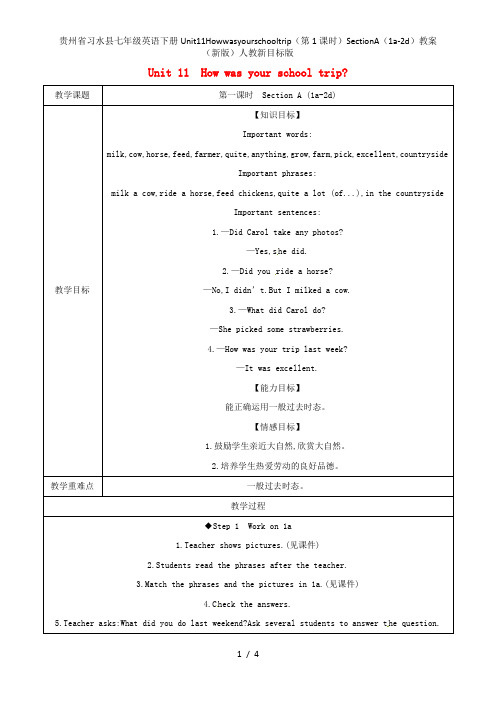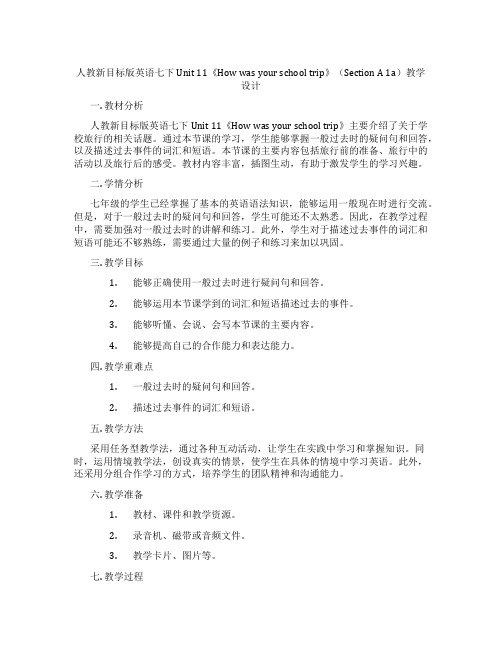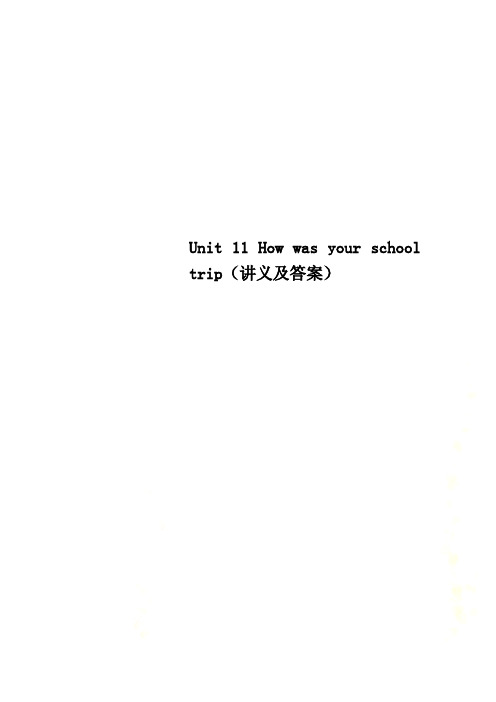七年级英语下册Unit11HowwasyourschooltripSectionA(1a_2d)课后作业(新版)人教新目标版
人教版七年级下英语Unit 11 How was your school trip Sectio

Date
June 15th
Transportation went by train/ took a train
Place
science museum
Activities
saw robots, met a guide, went to a gift shop
HelenБайду номын сангаас
Jim
THheeleynttahkoeugthhtethseamtriep wtraips,ebxucittitnhgebyuht Jaivmethtootuaglhlyt it was dtiefrfreibrelen. t feelings.
Jim: ...
Helen: ... Interviewer: ... (make a conclusion总结)
Will--- would
Time
Jane Tony
place
weather
activities
feeling
terrible great
good things
bad things
both
interesting, lovely exciting, cool, lucky, delicious, great, cheap
difficult,
slow, hot, large,
boring, expensive, fast
terrible,
I went to Chongqing last week. I really have a great time there. It’s exciting to meet friends there. We ate delicious food. We went to many interesting places and saw beautiful views. I felt so happy.
人教英语七年级 下册Unit 11 How was your school trip Section

yesterday? 5. _D_i_d_ you ride a horse last week?
6. _D_i_d_ he see any cows on the farm? Yes, he did.
7. Did he milk a cow on the farm? No, he __d_i_d_n_’. t
8. Were the strawbezxxkrw ries good? Yes, they
___w_e_r_e_. 9. Did you see any cows? Yes, I did. I __sa_wquite a lot. 10. I __fe_dthe chickens last week.
B:Yes ,she did .
√
√
zxxkw
√
√
zxxkw
zxxkw
zxxkw
A: What did Carol do? B: She picked some strawberries. A:Did they take anyzxxhkw ome ? B:Yes, they did . ...........
Peter: Hi, Eric. _H__o_w___ was your trip last week?
Eric: It w___a__s__excellent. I v__is_i_te__d_ my grandparents in the countryside. Peter: Oh, nice. What __d_i_d___ you do?
Does he have breakfast? →Did he have
人教七下Unit 11 How was your school trip?知识点

Unit 11 How was your school trip?Section A1. How was your trip yesterday?(1)本句为询问某事情况的常用句型,其中was是be动词的过去式,如果询问当前的情况则be动词用is。
其答语常用:It was great! (好极了) / It was OK.(还可以)/ It wasn’t good.(不好。
)/ All right.(很好。
)/ It was not bad.(还不错。
)等。
How + be+…?相当于What + be +… + like? 例如:-How was her holiday?-It was not bad.(2)How是疑问副词,意为“如何,怎样”,常用来引导特殊疑问句来询问方式、程度、状况等。
常用于以下交际用语中:1)How is/are +sb. ? 用来询问人的身体、工作、学习或生活等的状况。
例如:-How are you? -Fine, thank you.2)How is/are +sth.?用来询问某物或者某事的状况如何。
例如:How is your work?3)How do you do? 并不表示疑问,是第一次见面时的问候语,回答仍用此句。
例如:How do you do? ---How do you do?4)How is it going?/ How is everything going? 用来询问事情进展如何。
例如:How is it going? Very well./ Not too bad./just so so.2. feed chickenfeed 作及物动词,意为“喂养,饲养”,其后常接表示动物名称的词作宾语。
例如:My father’s job is to feed the animals.拓展:(1)feed..to…意为“把……喂给……吃”。
feed后接饲料或者食物名称做宾语,to为介词,其后一般接动物或者小孩等名词表示对象。
人教新目标版英语七下Unit 11《How was your school trip》(Sectio

人教新目标版英语七下Unit 11《How was your school trip》(Section B 2b)教学设计一. 教材分析人教新目标版英语七下Unit 11《How was your school trip》(Section B 2b)主要讲述了四个同学分享他们学校旅行的经历。
本节课的主要语言点是过去式的疑问句和回答,以及一些表示旅行经历的词汇和短语。
通过本节课的学习,学生能够听懂、会说、会读、会写与旅行经历相关的句子,并能够运用所学知识进行简单的交流。
二. 学情分析七年级的学生已经掌握了一定的英语基础知识,能够听懂、会说、会读、会写一些简单的英语句子。
但是,对于过去式的疑问句和回答的运用还有一定的困难,需要通过大量的练习来巩固。
此外,学生对于一些表示旅行经历的词汇和短语还不够熟悉,需要在教学中进行引入和讲解。
三. 教学目标1.学生能够听懂、会说、会读、会写与旅行经历相关的句子。
2.学生能够运用过去式的疑问句和回答进行简单的交流。
3.学生能够掌握表示旅行经历的词汇和短语。
四. 教学重难点1.过去式的疑问句和回答的运用。
2.表示旅行经历的词汇和短语的掌握。
五. 教学方法1.任务型教学法:通过设定具体的情境,让学生在完成任务的过程中运用所学知识。
2.交际法:通过师生之间的互动,生生之间的交流,让学生在实际的语言环境中学习英语。
3.情境教学法:通过图片、视频等媒体手段,为学生创设真实、生动的情境,提高学生的学习兴趣。
六. 教学准备1.教学课件:制作与本节课内容相关的课件,包括图片、视频等媒体素材。
2.学案:为学生准备学习任务单,包括旅行经历的相关问题。
3.黑板:准备黑板,以便在课堂上进行板书。
七. 教学过程1.导入(5分钟)利用图片或视频展示不同类型的旅行,引导学生谈论自己的旅行经历,激发学生的学习兴趣。
2.呈现(10分钟)展示本节课的主要内容,让学生听懂四个同学分享旅行经历的故事。
在呈现过程中,引导学生关注过去式的疑问句和回答,以及表示旅行经历的词汇和短语。
新人教版七年级英语下册Unit 11 How was your school trip Sectio

1b. Listen and answer the questions.
4.How to ……疑问句+不定式? They want to know how to make a model plane? 他们想知道如何制作飞机模型?(报纸) 5.take photos=take pictures照相 take a photo /photos of sb 给某人拍照 6.buy——过去式:bought 买 buy sb sth =buy sth for sb 给某人买某物 buy some lovely gift for my parents。 点睛:p74 7. lovely 形容词:可爱的 报纸:Helen has a lovely dog and she likes it very much。 Helen 有一个可爱的狗狗,她非常喜欢它。
2.It is +adj+to do sth 做某事很怎么样。 3.any 用于否定句,此句有didn’t)
(7)There were also too many people and I couldn’t really see or hear the guide. (人也太多而且我也不能看见或听见向导说的 话。)
expensive
3a. Look at the pictures of Bob’s school trip. Complete his diary entry.
贵州省习水县七年级英语下册Unit11Howwasyourschooltrip(第1课时)Secti

Unit 11 How was your school trip? 教学课题第一课时Section A (1a-2d)教学目标【知识目标】Important words:milk,cow,horse,feed,farmer,quite,anything,grow,farm,pick,excellent,countrysideImportant phrases:milk a cow,ride a horse,feed chickens,quite a lot (of...),in the countrysideImportant sentences:1.—Did Carol take any photos?—Yes,s he did.2.—Did you ride a horse?—No,I didn’t.But I milked a cow.3.—What did Carol do?—She picked some strawberries.4.—How was your trip last week?—It was excellent.【能力目标】能正确运用一般过去时态。
【情感目标】1.鼓励学生亲近大自然,欣赏大自然。
2.培养学生热爱劳动的良好品德。
教学重难点一般过去时态。
教学过程◆Step 1 Work on 1a1.Teacher shows pictures.(见课件)2.Students read the phrases after the teacher.3.Match the phrases and the pictures in 1a.(见课件)4.C heck the answers.5.Teacher asks:What did you do last weekend?Ask several students to answer t he question.6.Ask students to ask and answer in pairs.◆Step 2 Listening1.Listen and circle the three things Carol did on her school trip in 1a.2.Check the answers.(见课件)◆Step 3 Work on 1cAsk students to ask and answer questions about Carol’s school trip in pairs.A:Did Carol take any photos?B:Yes,she did.◆Step 4 Listening1.Ask students to listen and check(√) the questions they hear in 2a.2.Listen again and circle T for true or F for false for the sentences in 2b.3.Check the answers.(见课件)◆Step 5 Work on 2cLet students ask and answer questions about Carol’s visit to the farm in pairs.教学过程A:What did Carol do?B:She picked some strawberries.◆Step 6 Role-play1.Ask students to read the conversation and answer the questions.(见课件)(1)Where did Eric go last week?(2)What did Carol do?(3)How was the weather?2.Ask several students to answer the questions.3.Ask students to role-play the conversation in 2d in pairs i n front of the class.◆Step 7 HomeworkLearn the conversation in 2d by heart.板书设计Section A (1a-2d)重点短语k a cow2.ride a horse3.feed chickens4.quite a lot (of...)5.in the countryside重点句型1.—Did Carol take any photos?—Yes,she did.2.—Did you ride a horse?—No,I didn’t.But I milked a cow.3.—What did Carol do?—She picked some strawberries.4.—How was y our trip last week?—It was excellent.课堂练习Ⅰ.根据汉语意思完成句子1.——你看见过奶牛吗?——是的。
人教新目标版英语七下Unit 11《How was your school trip》(Sectio

人教新目标版英语七下Unit 11《How was your school trip》(Section A 1a)教学设计一. 教材分析人教新目标版英语七下Unit 11《How was your school trip》主要介绍了关于学校旅行的相关话题。
通过本节课的学习,学生能够掌握一般过去时的疑问句和回答,以及描述过去事件的词汇和短语。
本节课的主要内容包括旅行前的准备、旅行中的活动以及旅行后的感受。
教材内容丰富,插图生动,有助于激发学生的学习兴趣。
二. 学情分析七年级的学生已经掌握了基本的英语语法知识,能够运用一般现在时进行交流。
但是,对于一般过去时的疑问句和回答,学生可能还不太熟悉。
因此,在教学过程中,需要加强对一般过去时的讲解和练习。
此外,学生对于描述过去事件的词汇和短语可能还不够熟练,需要通过大量的例子和练习来加以巩固。
三. 教学目标1.能够正确使用一般过去时进行疑问句和回答。
2.能够运用本节课学到的词汇和短语描述过去的事件。
3.能够听懂、会说、会写本节课的主要内容。
4.能够提高自己的合作能力和表达能力。
四. 教学重难点1.一般过去时的疑问句和回答。
2.描述过去事件的词汇和短语。
五. 教学方法采用任务型教学法,通过各种互动活动,让学生在实践中学习和掌握知识。
同时,运用情境教学法,创设真实的情景,使学生在具体的情境中学习英语。
此外,还采用分组合作学习的方式,培养学生的团队精神和沟通能力。
六. 教学准备1.教材、课件和教学资源。
2.录音机、磁带或音频文件。
3.教学卡片、图片等。
七. 教学过程1.导入(5分钟)通过展示一张美丽的旅行图片,引导学生谈论自己最喜欢的旅行。
同时,询问学生是否曾经去过某个地方,引导学生思考一般过去时的用法。
2.呈现(10分钟)展示本节课的主要内容,包括旅行前的准备、旅行中的活动以及旅行后的感受。
通过图片、卡片等形式,呈现本节课的重点词汇和短语。
3.操练(15分钟)采用分组合作的方式,让学生进行角色扮演,模拟旅行中的各种情景。
初中英语人教版七年级下册《Unit 11 How was your school trip Sect

What did Xiong Er do on his last trip? He _________ on his last trip.
I can learn
--- What did Xiong Er do on the school trip? --- He________.
went fishing
New words
paintin g
painting可数名词,意为“油画;绘画”。 墙上有一些油画。 There are some paintings on the wall. [拓展]① paint动词,意为“绘画;给…上油 漆” 他把墙漆成了红色。 He painted the wall red. ② painter名词,意为画家;油漆工”。 他是一位著名的画家。 He is a famous painter.
Jane: so what did you do then? Toy: We went to a art museum. it was great. There were so many interesting things to see. I saw some really beautiful paintings. Then we had lunch at the museum restaurant. The food was really delicious! After that, we went to a special art room and drew pictures. It was so much fun! Jane: Sounds like you had a great school trip. Tony: Yes. We had a really good time!
人教新目标版英语七下Unit 11《How was your school trip》(Sectio

人教新目标版英语七下Unit 11《How was your school trip》(Section B 2a)教案一. 教材分析《人教新目标版英语》七下Unit 11主要讨论关于学校旅行的经历。
Section B 2a是一个阅读材料,描述了两个学生对于他们学校旅行的不同看法。
通过阅读这个材料,学生可以了解和练习一般过去时的被动语态。
本节课的目标是通过阅读和讨论,提高学生的阅读理解能力和语言运用能力。
二. 学情分析七年级的学生已经掌握了基本的英语语法和词汇,对于一般过去时和被动语态有一定的了解。
他们在学习过程中,需要通过大量的练习来提高语言运用能力。
同时,他们对于学校旅行这样的主题比较感兴趣,可以通过讨论和分享,激发他们的学习兴趣。
三. 教学目标1.能够理解并朗读课文2a。
2.能够通过阅读和讨论,掌握一般过去时的被动语态。
3.能够运用所学知识,描述自己的一次学校旅行经历。
四. 教学重难点1.重点:通过阅读理解,掌握一般过去时的被动语态。
2.难点:如何运用一般过去时的被动语态,描述自己的学校旅行经历。
五. 教学方法采用任务型教学法,通过阅读、讨论、分享和实践,激发学生的学习兴趣,提高他们的语言运用能力。
六. 教学准备1.课文2a的复印件或幻灯片。
2.与学校旅行相关的图片或视频。
3.一份学校旅行的计划或经历。
七. 教学过程1.导入(5分钟)通过提问,引导学生回忆自己的一次学校旅行经历。
例如:“你们有没有去过什么有趣的地方?”、“你最喜欢学校旅行的哪个部分?”等。
2.呈现(5分钟)向学生展示课文2a,并让学生独立阅读。
在阅读过程中,引导学生关注一般过去时的被动语态。
3.操练(10分钟)让学生两人一组,互相练习使用一般过去时的被动语态,描述自己的学校旅行经历。
教师可以提供一些关键词或句子结构,帮助学生进行练习。
4.巩固(5分钟)通过小组讨论,让学生分享彼此的学校旅行经历。
鼓励他们使用一般过去时的被动语态进行描述。
初中英语人教版七年级下册《Unit 11 How was your school trip Sect

They weclohreveea_l_py_.___ and
terrJibimle's&idbeoaring
The train was _s_lo__w___. He's not _in_t_e__re__sted in robots.
New words
dark
dark作形容词,意为“黑暗的”,反义词为 bright,意为“光明的” 天快黑了。 It' s getting dark. [拓展]①dark作形容词,还可意为“(色彩)深 的”;反义词为 light,意为“(色彩)浅的” 我爱好深蓝色。 I like dark blue. ②dark作名词,意为“黑暗;暗处” 她在黑暗中什么也看不见。 She could see nothing in the dark.
Warm-up
S1. WhMS2. WhEenacdhidstyuoduegnot tahdedres?a sentence.
S3. How was the weather there?
S4. WhSohdaidreyyoouugroswtoitrhy.?
New words
fast
fast作副词,意为“快地” 反义词为slowly“慢地 这个男孩跑得快。 The boy runs fast. fast用作形容词,意为“快的” 反义词为slow“慢的 我们可以乘快车。 We can take a fast train.
New words
guide
guide可数名词,意为“导游;向导” 导游带我们参观了博物馆。 The guide showed us around the museum. [拓展] guide及物动词,意为“带领;引导” 她领着她的学生过马路。 She guided her students across the road.
英语七年级下册Unit11HowwasyourschooltripSi

I shopped at the market yesterday afternoon.
I carried a lot back to Chengdu yesterday evening.
知识积累 —— 一般过去时用法
Tips
• 动词一般过去时,表示过去发生事情; • be 用was 或用were , have ,has 变had; • 谓语动词过去式,过去时间做标志; • 一般动词加--ed, 若是特殊请硬记; • 否定句很简单, 主语之后didn't 添; • 疑问句也不难, Did放在主语前; • 如果谓语之前有did, 谓语动词需还原; • 动词若是was,were, 否定就把not 添。
Yesterday afternoon, I
shopped at the market. I often shop at the park.
I carried a lot back to
I always carry a lot
Chengdu yesterday evening.of food.
知识积累 —— 一般过去时用法
I live in Chengdu
all the time. I often shop at the park.
I carried a lot back to I always carry Chengdu yesterday eveninga.lot of food.
知识积累 —— 动词过去式规则变化
Compare the verbs (动词).
Four days ago, I visited The Great Wall.
[推荐学习]七年级英语下册 Unit 11 How was your school trip Sec
![[推荐学习]七年级英语下册 Unit 11 How was your school trip Sec](https://img.taocdn.com/s3/m/aba316f8b14e852458fb5798.png)
UNIT11 How was your school trip?Section A 第1课时(1a〜1c)自主学习方案1.自学生词,并记住拼读及拼写。
2.预习课本找出重点短语及句子。
(见学案自学导练内容)3.读记后完成自学导练内容。
课堂导学方案Step1 情景导入Teacher:We had a school trip last week. Did you have a good time? How was your school trip?Students : Not bad/Pretty good/Great/Terrible.Teacher :Did you take any photos?Did you feed chickens?What did you do?Please tell us what you did. Do you want to know what Carol did?环节说明:以上周的校游为话题,引出一般过去时态,简洁明了,直奔主题。
Step 2完成教材1a-1c的任务1.认真观察图片,将图片和la中所给的短语匹配。
集体核对答案,完成la。
(2分钟)2.教师领读la中的词组,学生跟读并且识记,然后两人一组互相提问。
以小组为单位总结动词过去式的构成规则,教师补充点拨。
(5分钟)3.大声朗读图片中的小对话,提前感知听力内容。
(2分钟)4.认真听录音,圈出Carol在校游时所做的事情,集体核对答案,完成lb的听力任务。
(3分钟)5.练习lc中的对话,并请学生表演。
(2分钟)6.模仿lc中的对话,利用la中的图片信息,两人一组来谈论Carol在校游时所做的事情,邀请几组学生来表演对话。
(4分钟)参考案例:A:Did Carol take any photos?B:Yes,she did. /No,she didn’t.7.小结训练。
(4分钟)(1)— What did Sam do on the farm?—He B chickens.A feedsB fedC grows(2)— C you to the zoo last Sunday?—No,I didn'.A. Do;goB. Are;going C . Did;go环节说明:听说结合,第一时间向学生传达语言目标,结对对话练习和小结训练,使语言目标得以强化。
Unit 11 How was your school trip(讲义及答案)

Unit 11 How was your school trip(讲义及答案)Unit 11 How was your school trip?(讲义)Part 1 Words and Expressionsmilk /mɪlk/ v. 挤奶cow /kaʊ/ n. 奶牛milk a cow 挤奶horse /hɔː(r)s/ n. 马ride a horse 骑马feed /fiːd/ v.(fed /fed/)喂养;饲养feed chickens 喂鸡farmer /'fɑː(r)mə(r)/n. 农民;农场主quite /kwaɪt/ adv. 相当;完全quite a lot (of…) 许多anything /'enɪθɪŋ/pron.(常用语否定句或疑问句)任何东西;任何事物grow /grəʊ/ v. (grew/ɡruː/)种植;生长;发育farm /fɑː(r)m/ n. 农场v. 务农;种田pick /pɪk/ v. 采;摘excellent /'eksələnt/adj. 极好的;优秀的countryside /'kʌntrisaɪd / n. 乡村;农村in the countryside 在乡下;在农村yesterday /'jestə(r)di/adv. 昨天flower /'flaʊə(r)/n. 花worry /'wʌrɪ/ v. & n. 担心;担忧luckily /'lʌkɪli/ adv. 幸运地;好运地sun /sʌn/ n. 太阳museum /mjuː'ziəm/n. 博物馆fire /'faɪə(r)/n. 火;火灾fire station 消防站painting /'peɪntɪŋ/n. 油画;绘画exciting /ɪk'saɪtɪŋ/adj. 使人兴奋的;令人激动的lovely /'lʌvli/ adj. 可爱的expensive /ɪk'spensɪv/ adj. 昂贵的cheap /tʃiːp/ adj. 便宜的;廉价的slow /sləʊ/ adj. 缓慢的;迟缓的fast /fɑːst/ adj. & adv. 快地(的)slow & fastadj. 缓慢的;迟缓的adj.& adv. 快地(的)adj.a slow driver a fast walkerI missed the fast train and had to get the slow one.adv.slowly & fastCan you speak slowly? The boy runsfast.interesting adj. 感兴趣的be interested in 对……感兴趣I am interested in music and my brother is interested in sports. We had a great time on the farm yesterday. We were interested in milking the cow.be interested in 主语通常是人,接动词时用动词的-ing 形式。
- 1、下载文档前请自行甄别文档内容的完整性,平台不提供额外的编辑、内容补充、找答案等附加服务。
- 2、"仅部分预览"的文档,不可在线预览部分如存在完整性等问题,可反馈申请退款(可完整预览的文档不适用该条件!)。
- 3、如文档侵犯您的权益,请联系客服反馈,我们会尽快为您处理(人工客服工作时间:9:00-18:30)。
Unit 11 How was your school trip
一、根据句意及提示补全单词
1.The farmer has more than 500 ________(马) on his farm.
2.Can you m________ cows?
3.—When did you f________ your chickens?
—About an hour ago.
4.I often go to visit my grandparents in the c________ with my parents. 5.The coat is q________ expensive.I want to buy a cheaper(较便宜的)one.
二、单项选择
6.When our teacher heard of the news, he was too angry to say
________.(烟台)
A.everything B.nothing
C.something D.anything
7.—How was your trip?
—________.(青海)
A.It was snowy
B.It was great
C.I was tired
8.Peter will ________ you ________ the building and you can meet
everyone.(天津)
A.lend; to B.show; around
C.compare; with D.brush; off
9.Tom is excellent ________English.
A.at B.for C.in D.on
10.________, we saw the sun rise on top of Mount Tai.(青岛)
A.Lucky B.Luckily
C.Unlucky D.Unluckily
三、用所给单词的适当形式填空
11.The rain stops.It's ________(sun) again.Let's go out and play games. 12.—I'm going to have an English exam tomorrow.
—Good ________(luckily) to you.
13.I ________(watch) TV with my parents at home last Sunday.
14.They often go ________(fish) when they are free.
15.The idea sounds ________(good).
四、用方框中所给单词或短语的适当形式填空
16.He had ________________ money and he helped a lot of poor
people.
17.What an ________________ idea!
18.The farmers ________________ last year.
19.Don't ________________ the flowers in the park.
20.The new textbook ________________ last week.
答案:
一、1.horses k 3.feed 4.countryside 5.quite
二、6.D 点拨:句意“当我们的老师听到这个消息时,他太生气了什么话都说不出来了。
”
too...to....“太……而不能……”表否定含义,所以后面要用anything。
故选D 。
7.B 点拨:本题用交际法。
It was snowy多雪的;It was great它很棒;I was tired我
很累。
句意:——你的旅行怎么样?——它很棒。
8.B 点拨:lend sth. to sb.“把某物借给某人”;show...around “带领……参观”;
compare...with“和……相比较”;brush ...off “被刷掉”。
由后半句“你会见到每个人”可知彼得将带你参观这栋楼。
9.C 点拨:be excellent in...表示“在……方面很优秀”。
10.B 点拨:本题用词义辨析法。
lucky幸运的;luckily幸运地;unlucky不幸的;unluckily
不幸地。
句意:幸运的是,我们在泰山顶上看到日出了。
三、11.sunny 12.luck 13.watched 14.fishing 15.good
四、16.so much 17.excellent
18.grew apples 19.pick 20.came out。
